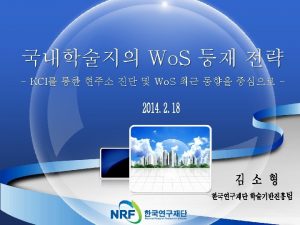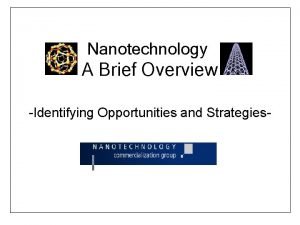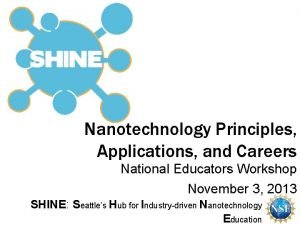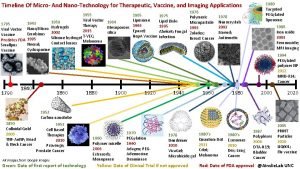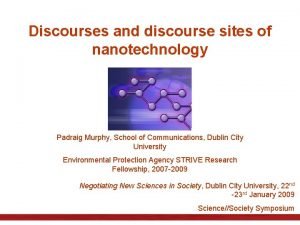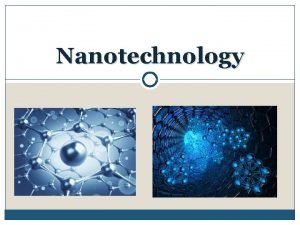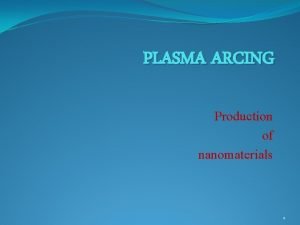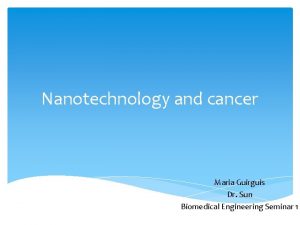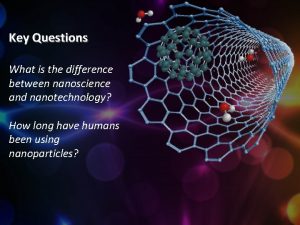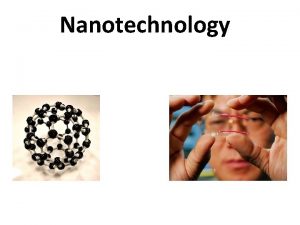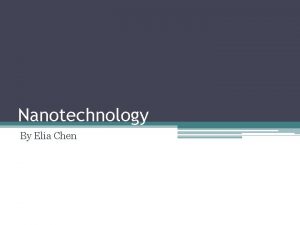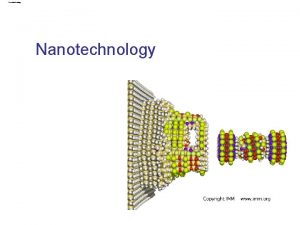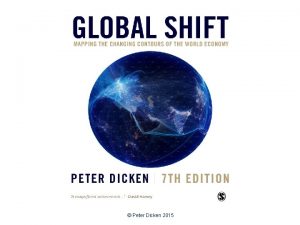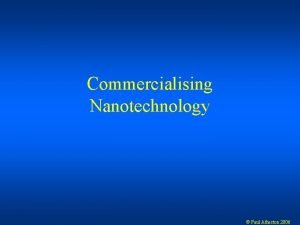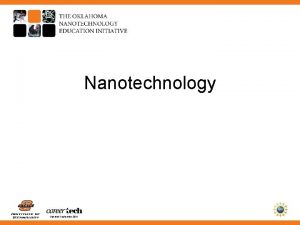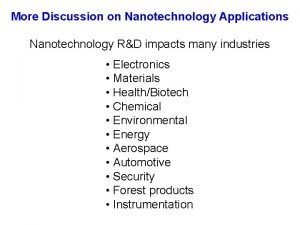Nanotechnology Peter Monfore NANOTECHNOLOGY What is Nanotechnology Nanotechnology











- Slides: 11

Nanotechnology Peter Monfore

NANOTECHNOLOGY What is Nanotechnology? Nanotechnology is the creation of functional materials, devices, and systems through control of matter on an atomic or molecular scale. Why do we care? Nanotechnology is increasingly gaining momentum and transitioning from theoretical examples to practical applications. We must explore the ethics of nanotechnology to see In whether it is a viable complex technology tr that can be safely used and implemented. od uc tio © 2003 Peter Monfore

NANOTECHNOLOGY How will nanotechnology help solve problems? The implications of being able to manipulate materials, devices, and systems on the molecular scale opens up infinite possibilities. These concepts of nanotechnology are so broad and pervasive, that they will no doubt influence every existing science and technology while pioneering even more advanced/complex technologies. It is nearly impossible to predict what these will bring to humanity, whether it be good, or bad. Beneficial uses of nanotechnology: a) medicines as nanoparticles with vastly improved delivery and control characteristics b) greatly improved printing brought about by nanometer-scale particles that have the best properties of both dyes and pigments. c) vastly improved lasers and magnetic disk heads made by controlling layer thickness to better than a nanometer. d) “Nano. Food” manufactured for the sole purpose of being molecularly identical to its organically grown counterpart. In tr od uc tio © 2003 Peter Monfore

NANOTECHNOLOGY What are the impacts of Nanotechnology? Intended impacts (benefits): influenced and determined by our assumptions, values and beliefs. Example: nanotech can aid medicine at an unparalleled level. Nanotech can rid hunger through manufactured food and water. Nanotech can repair clothing, or repair the ozone layer. Undesirable consequences (“factual”): Imprecision in data and models (risk). Example: repairing the ozone layer with nanotech doesn’t alleviate global warming. Unintended impacts (“axiological”): Indeterminacy and ignorance. I m pa cts Example: repairing the ozone layer disrupts the ecology of a rare species which was thriving under global warming and causes its extinction. © 2003 Peter Monfore

NANOTECHNOLOGY Nanotechnology: A Utilitarian Perspective Definition: “the creed which accepts as the foundation of morals, utility or the greatest happiness principle, holds that actions are right in proportion as they tend to promote happiness, wrong as they tend to produce the reverse of happiness. By happiness is intended pleasure and the absence of pain; by unhappiness, pain and the privation of pleasure” John Stuart Mill (Utilitarianism, ii, 1863). Therefore, the ends-based principle asks us to make the decision that would result in the greatest good for the greatest number (or the least suffering for the most people) based on what we perceive would happen as a result of our decision. Example: If we applied Utilitarian ethics to nanotechnology we would claim that it was ethically feasible if the use of nanotechnology offered the greatest good for the greatest number of people. Et hi If we take the example of “Nano. Food” we can see that the food will no doubt cs: feed a great deal of people. However, the implementation of Nano-made food would no doubt disrupt the. Ut global economy putting many farmers and companies out of work. Although hunger is a huge issue in developing countries the use of Nano. Food may cause just ilit as many problems as it alleviates. ar ia © 2003 Peter Monfore

NANOTECHNOLOGY Nanotechnology: A Rule-Based Viewpoint Rule-based ethics involves arriving at moral standards that regulate right and wrong conduct. Ethical principles are interpreted according to the absolute rule, or according to personal rules based on moral or religious beliefs. The rule-based thinker would argue that one can never know the outcome of a decision; one can only follow the principle or rule that is best for the kind of world in which we would like to live. Applying this to nanotechnology we must decide an overall guideline for its use and implementation. Using the example of Nano. Food: Our overall guideline would be that food can be made using nanotechnology so long as it is 100% identical to organic food, and that it offers no health risk beyond the original organic food. Et hi We then apply this rule to all Nano. Food produced in the world and regulate all companies cs: offering such products. R ule © 2003 Peter Monfore

NANOTECHNOLOGY A Careful Decision The care-based principle advises us to put ourselves in the position of those who would be affected by the decision. That is, to imagine what action we would want to be taken if it were to be decided for ourselves. Example: We are deciding whether or not to feed starving people in developing countries using Nano. Food. Applying care-based ethics to this situation we put ourselves in the position of the starving person and ask: “If I were starving would I want someone to give me food? ” In this situation we would most likely say yes. Et hi cs: C ar However, many developing countries have declined Genetically Modified food for their countries because they worry about the implications of GM food on its people and agriculture. Developing countries may also deny aid from Nano. Food for similar reasons. © 2003 Peter Monfore

NANOTECHNOLOGY Nanotechnology and Judeo/Christian Beliefs Judeo/Christian ethics focus on rules passed on through God: mainly the Bible and other various scriptures. This ethical code stresses Love as the underlying factor in all decisions. Such guidelines as the 10 Commandments also are prominent: a) Thou shall not kill b) Thou shall not steal, etc. Houston Smith states that: 1) Humility: incumbent to treat ourselves fully as one, but no more than one. 2) Charity: in being one you must treat your neighbor as one. 3) Veracity: truthfulness and the capacity to see things as they are freed from subjective distortion. …are underlying principles in most religions. If we apply these rules to nanotechnology we no doubt would find that the Judeo/Christian ethical code condones technology if it is beneficial to mankind. Judeo/Christian beliefs also state that man has dominion over nature and the animals therein. Therefore, nanotechnology could adversely affect nature since man was granted dominion over it by God. If nanotechnology had adverse affects towards humanity then it would not be acceptable under the aforementioned standards. Et hi cs: Ju de © 2003 Peter Monfore

NANOTECHNOLOGY Nanotechnology and Buddhism emphasizes compassion and from that stems the belief that the sick should be helped. "Whoever, O monks, would nurse me, he should nurse the sick" (Zysk, 1991: 41). The Four Noble Truths: Dukkha: The reality and universality of suffering. Suffering has many causes: loss, sickness, pain, failure, the impermanence of pleasure. Samudaya: The cause of suffering is a desire to have and control things. It can take many forms: craving of sensual pleasures; the desire for fame; the desire to avoid unpleasant sensations, like fear, anger or jealousy. Nirodha: Suffering ceases with the final liberation of Nirvana (a. k. a. Nibbana). The mind experiences complete freedom, liberation and non-attachment. It lets go of any desire or craving. Magga: The eightfold path leads to the cessation of suffering. These core Buddhist beliefs attest to the fact that humanity should not strive or desire to control things. Yet many philosophers argue that Buddhism is one of the strongest proponents of modern science. Et hi cs: B ud Buddhism relies heavily on a synergy between humanity and the world. The Yin -Yang relationship is often described as dropping a pebble into a pond. The ripples move out and affect everything in a new and dynamic way. Using these examples I am under the impression that nanotechnology greatly contradicts Samudaya. Humanity, as viewed with the Buddhist perspective, must not strive for continual control over the earth and the molecular entities in it. © 2003 Peter Monfore

NANOTECHNOLOGY A Risk Analysis of Nanotechnology Risk Assessment: What are the risks imposed by various technologies? a) What can go wrong? Self-Replicating Nanomachines on the loose. b) How likely is it to happen? Possibilities of rogue replication of AI must be non-existent. c) What are the consequences? Nanomachines infect host with virus, host dies. Global Quarantine. Anti-Nanomachines released. Risk Valuation: Are these risks acceptable? Option Generation: Can these risks be reduced? Ri sk How can the options be evaluated? Cost/Benefit: A na lys © 2003 Peter Monfore

NANOTECHNOLOGY Looking Toward the Future Nanotechnology remains greatly theoretical at this point. With such a complex technology in the hands of humanity it is not yet clear to what extent we will be able to use nanotechnology. It is also not clear what impacts manipulating things on the molecular level will have on the world. As our technologies progress we are having an increasingly difficult time understanding their impacts in the long run. More often than not economic factors fuel the development and use of these pioneer technologies. It is not until many years later that companies are accountable for the damage that they have caused, both indirectly and directly. As we look toward the future we should always ere on the side of caution. Our motivation should not be purely scientific or economic. C We must consider all of the ethical factors if we are to be responsible for our own creations. on cl us io © 2003 Peter Monfore
 Journal of nanoscience and nanotechnology sci
Journal of nanoscience and nanotechnology sci What is nanotechnology
What is nanotechnology Nanotechnology
Nanotechnology Timeline of nanotechnology
Timeline of nanotechnology Interpretations of moore's law assert that
Interpretations of moore's law assert that Nanotechnology fact or myth articles
Nanotechnology fact or myth articles Sites
Sites Nanotechnology definition
Nanotechnology definition Nbic, gnr, grain, bang
Nbic, gnr, grain, bang Plasma arcing
Plasma arcing Disadvantage of nanotechnology
Disadvantage of nanotechnology Difference between nanoscience and nanotechnology
Difference between nanoscience and nanotechnology
